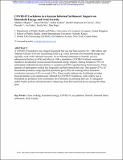| dc.contributor.author | Shupler, Matthew | |
| dc.contributor.author | Mwitari, James | |
| dc.contributor.author | Gohole, Arthur | |
| dc.contributor.author | de Cuevas, Rachel Anderson | |
| dc.contributor.author | Puzzolo, Elisa | |
| dc.contributor.author | Čukić, Iva | |
| dc.contributor.author | Nix, Emily | |
| dc.contributor.author | Pope, Dan | |
| dc.date.accessioned | 2021-08-13T06:35:51Z | |
| dc.date.available | 2021-08-13T06:35:51Z | |
| dc.date.issued | 2020-05 | |
| dc.identifier.citation | Shupler, M., Mwitari, J., Gohole, A., de Cuevas, R. A., Puzzolo, E., Cukic, I., ... & Pope, D. (2020). COVID-19 Lockdown in a Kenyan informal settlement: Impacts on household energy and food security. MedRxiv. | en_US |
| dc.identifier.other | https://doi.org/10.1101/2020.05.27.20115113 | |
| dc.identifier.uri | https://www.medrxiv.org/content/medrxiv/early/2020/05/29/2020.05.27.20115113.full.pdf | |
| dc.identifier.uri | http://dspace.amref.org/handle/123456789/49 | |
| dc.description | This preprint from MedRxiv is now published in Renewable and Sustainable Energy Reviews doi: 10.1016/j.rser.2021.111018 | en_US |
| dc.description.abstract | A COVID-19 lockdown may impact household fuel use and food security for ~700 million subSaharan Africans who rely on polluting fuels (e.g. wood, kerosene) for household energy and
typically work in the informal economy. In an informal settlement in Nairobi, surveys
administered before (n=474) and after (n=194) a mandatory COVID-19-related community
lockdown documented socioeconomic/household energy impacts. During lockdown, 95% of
participants indicated income decline or cessation and 88% reported being food insecure. Three
quarters of participants cooked less frequently and half altered their diet. One quarter (27%) of
households primarily using liquefied petroleum gas (LPG) for cooking before lockdown
switched to kerosene (14%) or wood (13%). These results indicate the livelihoods of urban
Kenyan families were deleteriously affected by COVID-19 lockdown, with a likely rise in
household air pollution from community-level increases in polluting fuel use. To safeguard
public health, policies should prioritize enhancing clean fuel and food access among the urban
poor. | en_US |
| dc.description.sponsorship | This research was funded by the National Institute for Health Research (NIHR) (ref: 17/63/155) using UK aid from the UK government to support global health research. | en_US |
| dc.language.iso | en | en_US |
| dc.publisher | Cold Spring Harbor Laboratory Press | en_US |
| dc.subject | Clean cooking | en_US |
| dc.subject | Household energy | en_US |
| dc.subject | COVID-19 | en_US |
| dc.subject | Air pollution | en_US |
| dc.subject | Nairobi | en_US |
| dc.subject | Informal urban settlement | en_US |
| dc.subject | Food security | en_US |
| dc.title | COVID-19 Lockdown in a Kenyan Informal Settlement: Impacts on Household Energy and Food Security | en_US |
| dc.type | Article, Journal | en_US |

